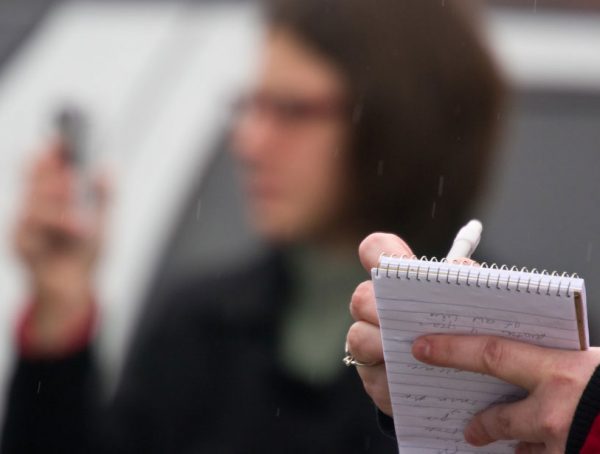Many journalists had to move from the studios to home when the country shut down because of the Covid-19 pandemic. Working from their own houses or apartments presented consequent challenges, especially for journalists whose job is usually different than classic office work.
Amanda Salas, an entertainment anchor for Good Day LA, reflects on how working from home did not mean working less — on the contrary.
“I feel like we’ve all been working more throughout this pandemic because we don’t have that separation with the office and home,” says Salas.
Being a journalist is already rarely a 9 to 5 job, but these working conditions made it even harder to put a clear limit between work and private life.
“I start my day at 4 am and everyone asks me ‘well when are you off?’ Um, when I’m done working,” jokes Salas.
Kristen Bartlett, a writer for Full Frontal with Samantha Bee, faced the same problems when working from home, and found it hard to take time for herself. But working all the time, and thinking about work when not working can be pretty unhealthy. Flavio Morales, executive vice president of Endemol Shine Latino, US Initiative, explains how he felt while working from his wife’s office at home.
“I think it was psychological because you’re working from home and you feel like you’re somehow cheating, it took a while to get used to what was good and what was healthy,” argues Morales.
Everyone is available, and transportation costs and delays are no longer an issue, which changes the way journalists usually do their job. All of a sudden everything seems more accessible and work can get done quicker. Morales even recalls a time where he worked so much, his boss has to tell him to take a few days for himself.
“My boss called and said ‘Take 5 days off because I was starting my day with our office in Mexico and then ending our day at like 6-7 and not realizing I was not leaving this room. I was just grabbing snacks and coming back because your brain tells you you have to work, you’re not driving so you have to work,” says Morales.
So how to stay healthy with these working conditions? Some suggest having side projects that bring a little fresh air.
“In terms of being a creative writer specifically, I think always working on a project that gives you life is the thing that always keeps me healthy […] I feel like I’m building something, even if it’s just for me,” says Bartlett.
Others believe in scheduling and organizing their day in order to separate private and professional life.
“One thing that we are trying to get back on is what is [your] schedule, when do you know that everyone is going to have that one hour off, put the phone away, you know you’re not available,” says Morales.
Julie DeJoie, an executive producer for Snowfall, agrees with the idea of scheduling and allowing time for work and time for oneself.
“I think it’s just what everyone has been saying, it’s just setting boundaries […], setting schedules and realizing […] you sort of are always available, but I think it’s okay to say, you know, I’m actually off work at this point, and then taking the time and trying to schedule your day, really stick to it and give yourself some downtime,” says DeJoie.
In the end, this pandemic is affecting everyone, so it is important to try our best but also to realize these conditions are exceptional.
“We’re surviving right now, we’re all surviving so I feel like it’s okay for us to acknowledge that and to take time,” concludes Bartlett.
Our experts shared their views during the conference “Creativity in a Time of Crisis” organized by the Television Academy.








